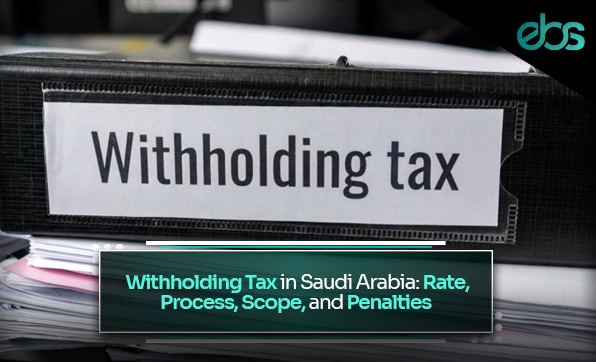Saudi Arabia has rapidly emerged as a center for businesses and trade around the world, especially with its ambitious vision to diversify the economy with 2030 economic reforms. One of the important tax responsibilities for companies working in Saudi Arabia is one-specific cross-border payments-the Saudi Arabian rule. This system is designed to ensure that the tax revenue is collected at the point of payment at the point of payment, the government strengthens the technique to stabilize its tax responsibilities. This article will discuss information related to withholding-tax in Saudi Arabia, including its scope, rates, procedures, and consequences for non-compliance. Whether you are a foreign-service provider or a local business that pays non-residents, it is important to understand KSA and understand that it is important to remain in line with the tax policies nearby.
What Is Withholding Tax (WHT) in Saudi Arabia?
Withholding tax (WHT) is a tax deducted at source from payments made by a Saudi resident entity or individual to a non-resident for services or activities performed within the government.
According to Withholding Tax Law KSA, income generated from activities in Saudi Arabia are taxable, regardless of the recipient’s country of residence. Essentially, WHT Saudi Arabia guarantees that foreign entities or people pay taxes on the incomethey derive from the government on the time of payment.
WHT primarily targets non-residents, without a permanent establishment (PE) in Saudi Arabia. It applies to a variety of payments, including royalties, technical or consulting fees, dividends, interest, and other disbursements related to services rendered wholly or partially in Saudi Arabia.
Scope of Withholding Tax in Saudi Arabia
WHT applies to payments made to non-resident entities (or people) that generate income from activities performed inside Saudi Arabia. Here are a few examples of why WHT is relevant:
- Non-Residents: WHT applies to foreign entities that don’t have a permanent establishment (PE) within the government.
- Saudi Source Income: Any income that arises from activities performed inside Saudi Arabia are subject to withholding tax including income from real-estate income, share disposals, or leasing of movable assets used within the country.
- Services Rendered in Saudi Arabia: Payments for services that are performed wholly or partially inside Saudi Arabia, like consulting or technical services, could be subject to WHT.
Common Examples of Withholding Tax Applications
Understanding sensible eventualities can assist in illustrating how WHT works in Saudi Arabia. Here are a few not unusual place examples:
- Consulting Services: If a Saudi agency hires a non-resident representative to offer recommendations on a particular project, although a part of the work is achieved remotely, the payments to the representative are a concern to WHT.
- Royalties: A Saudi enterprise licenses a software program or highbrow assets from an foreign agency. The royalty payments are subject to a 15% WHT until a Double Taxation Treaty (DTT) reduces the fee.
- Interest on Loans: When a non-resident financial institution lends cash to a Saudi enterprise, the hobby payments are subject to a 5% withholding tax.
- Equipment Rental: A Saudi agency rents equipment from a non-resident entity. The condo payments are subject to a 5% WHT if the system is utilized in Saudi Arabia.
Withholding Tax Rates in Saudi Arabia
The rate of withholding tax depends upon the type of income being paid to the non-resident. Below is a listing of common type of income and their related WHT rates:
| Type of Income | Withholding Tax Rate |
| Dividends | 5% |
| Interest and loan fees | 5% |
| Royalties | 15% |
| Management fees | 20% |
| Rent, technical and consulting services | 5% |
| Other services (e.g., training, marketing) | 15% |
Notable Points:
- Technical Services: These are generally taxed at 5%, even though a few exceptions exist relying on the character of the services.
- Double Taxation Treaties (DTTs): WHT rates can be decreased or waived if the non-resident is from a country with a DTT with Saudi Arabia.
How to Calculate Withholding Tax in Saudi Arabia?
Calculating WHT in Saudi Arabia includes the subsequent steps:
- Identify the Applicable Rate: Based on the type of income being paid, decide the proper WHT rate from the listing supplied above.
- Determine the Gross Payment: calculate on the total payment before any deduction.
- Calculate the WHT Amount: Multiply the gross-amount by the applicable WHT rate to determine the amount to withhold.
Formula: In Saudi Arabia, the formula to calculate tax:
WHT = payment amount × tax rate.
For example, if a Saudi business pays SAR 300,000 to a foreign advisor at a 10% tax rate, the tax is 300,000 × 10% = SAR is 30,000.
Withholding Tax Process in Saudi Arabia
The Process for making use of WHT in Saudi Arabia follows those steps:
- Identify the Withholding Party: The withholding character is the Saudi resident entity or person making the fee to the nonresident.
- Deduct the Tax at Source: Tax must be deducted before the payment is made to the non-resident.
- Remit the Tax: The deducted tax must be remitted to the Zakat, Tax, and Customs Authority (ZATCA) within 10 days from the end of the month in which the payment was made.
- File WHT Returns: The withholding character ought to record a month-to-month go-back detailing the non-resident recipient, fee type, quantity, and tax withheld. An annual go-back is needed within one hundred and twenty days of the monetary year—quit.
Penalties for Non-Compliance with Withholding Tax
Failure to conform with ZACTA Withholding Tax regulations can result in severe consequences.
- Late Payment Penalty: A 1% penalty is imposed on the unpaid tax for every 30 days of delay.
- Fines for Incorrect Filings or Tax Evasion: If ZATCA identifies tax evasion or wrong filings, fines range starting from 5% to 25% of the unpaid tax might also apply.
- Interest: Additional charges may apply for late remittance.
Double Taxation Treaties (DTTs) and WHT
Saudi Arabia has signed over 50 Double Taxation Treaties (DTTs) with nations like France, Germany, the UK, and China. These treaties aim to save you from double taxation on equal income by way of permitting tax discounts or exemptions on certain styles of earnings, including dividends, royalties, and hobbies.
Key Features of DTTs:
- Reduced Rates: DTTs frequently offer decreased WHT quotes or entire exemptions for certain sorts of earnings.
- Eligibility for Benefits: Non-citizens should offer a Tax Residency Certificate (TRC) from their domestic USA to qualify for DTT benefits.
- Refund Mechanism: If the DTT charge that was implemented at the time of withholding, the non-resident can usually apply for a reimbursement from ZATCA.
Conclusion
Withholding tax in Saudi Arabia plays an important role in making sure that the government gets tax revenues from foreign entities or individuals that generate income in this region. Understanding the WHT rate, process, and the scope compliance requirement is important for companies engaged in cross-border transactions. By complying with WHT rules and leveraging double taxation treaties, companies can lessen their tax burden and avoid high-priced penalties. For non-resident entities, timely submission and correct tax remittance are important for easy operations in Saudi Arabia’s developing enterprise landscape.
ebs Chartered Accountants can help companies in Saudi Arabia by making sure they comply with withholding tax rules, optimizing tax liabilities, and handling well-timed filings and remittances.
FAQs
What is the withholding tax rate in Saudi Arabia?
The standard withholding tax rate ranges from 5% to 20%, depending on the type of payment.
Who is subject to withholding tax in Saudi Arabia?
Non-resident entities receiving income from Saudi sources are subject to withholding tax.
How is withholding tax paid in Saudi Arabia?
The resident payer must deduct the tax and remit it to the Zakat, Tax and Customs Authority (ZATCA).
What are the penalties for late withholding tax payment?
Penalties include a fine of 1% of the unpaid tax per 30 days of delay.


